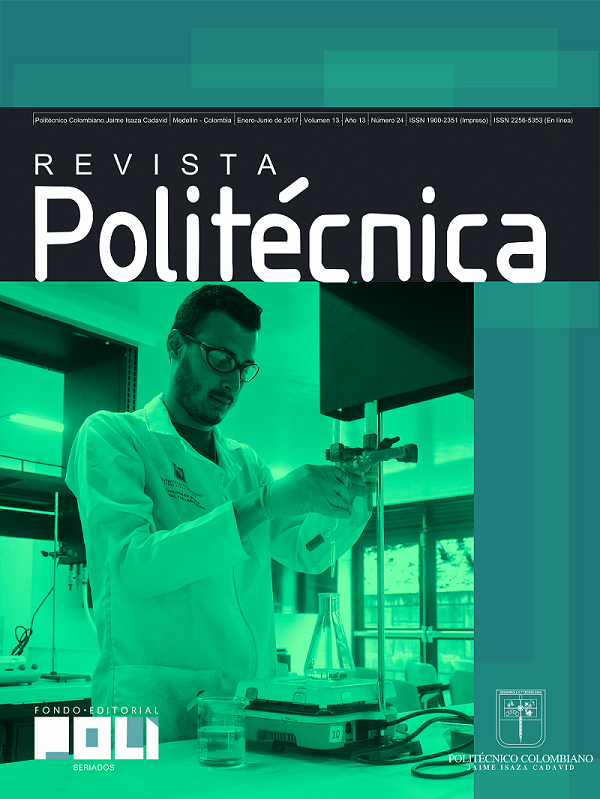Desing and construction of a portable devica for counting red tilapia fingerlings
Keywords:
red tilapiafingerlings, automatic counting, computer vision, raspberry pi, python languageAbstract
Commercialization of fingerlings is carried out by units and not by weight in the fishery sector of the country, under the argument that it is required to know the exact amount of food and definition of population densities. The proposal consists of an automatic device with variable tilt, portable processing unit by using free software, internal artificial lighting and touchscreen for the count of red tilapia fingerlings between 1 and 2cm in size. The device is validated starting from the isolation of the external light and effectiveness of the internal artificial illumination, suitable angle of inclination to obtain appropriate rates of descent, validation of the accuracy of the realized counting and comparison of times with the traditional manual method. A device with the expected lighting characteristics, count with an error of less than 2%, low cost and portability required in fish farms are obtained.Article Metrics
Abstract: 914 HTML (Español (España)): 266 PDF (Español (España)): 605 XML (Español (España)): 36References
Ricardo García, Luz Gutiérrez, and Carlos David, "El uso de los probióticos en la industria acuícola. Artículo de," Alimentos Hoy, pp. 165-178, 2015.
Yinet Parrado, "Historia de la Acuicultura en Colombia," AquaTIC, pp. 60-77, 2012.
María Merino, Sara Bonilla, and Fernando Bages, "Diagnóstico del estado de la Acuicultura en Colombia," Bogotá, 2013.
Jer-Vui Lee et al., "The Use of Vision in a Sustainable Aquaculture Feeding System," Research Journal of Applied Sciences, Engineering and Technology 6(19), pp. 3658-3669, 2013.
C Cho and D Bureau, "A review of diet formulation strategies and feeding systems to reduce excretory and feed wastes in aquaculture.," Aquac, pp. 349-360, 2001.
A Navarro, E García, E Inzunza, C Liera, and O López, "Sistema automático para conteo de peces utilizando sensores infrarrojos y comunicación inalámbrica," in Congreso Internacional en Ingeniería Electrónica, 2014, pp. 176-181.
Rubén Vásquez, Ahmed Alejandro Cardona, and Leidy Yohana Ocampo, "Propuesta de sistema de conteo de alevines de tilapia roja de bajo costo usando técnicas de visión artificial," Revista Politécnica, no. 21, pp. 85-95, Julio-Diciembre 2015.
Isaac Ashish, Kishore Malay, and Sarkar Biplap, "Computer vision based method for quality and freshness check for fish from segmented gills," Computer and electronics in Agriculture, no. 139, pp. 10-21, 2017.
Ambra Di Rosa, Francesco Leone, Federica Cheli, and Vincezco Chiofalo, "Fusion of electronic nose, electronic tongue and computer vision for animal source food authentication and quality assessment: A review," Journal of Food Engineering, no. 210, pp. 62-75, 2017.
Vicente Atienza, Gaberiela Andreu, Fernando López, José Valiente, and Vicente Puig, "Vision-based discrimination of tuna individuals in grow-out cages through a fish bending model," Computers and Electronics in Agriculture, no. 130, pp. 142-150, 2017.
Yane Duan et al., "An automatic counting system for transparent pelagic fish eggs based on computer vision," Aquacultural Engineering, no. 67, pp. 8-13, 2015.
National Instruments. (2017, Junio) LabVIEW - National Instruments. [Online]. http://www.ni.com/es-cr/shop/labview.html
Ana González et al., Técnicas y Algoritmos Básicos de Visión Artificial. La Rioja: Universidad de la Rioja, 2006.
Jorge Fuentes, Abraham Navalón, Antoni Reolid, and David Varón, "Visión Artificial Aplicada al Control de la Calidad," 3C Tecnología, pp. 297-308, 2014.
OpenCV Team. (2017, Junio) OpenCV. [Online]. http://opencv.org/
Krupali Mistry and Avneet Saluja, "An Introduction to OpenCV using Python with Ubuntu," International Journal of Scientific Research in Computer Science, Engineering and Information Technology, pp. 65-68, 2016.
Gary Bradski and Adrian Kaehler, Learning OpenCV. Wisconsin: O´Reilly, 2008.
Guido Van Rossum. (2009, Septiembre) Python. [Online]. http://docs.python.org.ar/tutorial/pdfs/TutorialPython2.pdf
Alvaro Romero, Alejandro Marín, and Jovani Jiménez, "Sistema de clasificación por visión artificial de mangos tipo Tommy," UIS Ingenierías, p. 14, 2015.
José Suárez, Luis Solis, Rodrigo Castañeda, José Ortiz, and Hamurabi Gamboa, "Algoritmo de procesamiento digital," Revista Electrónica de Ingeniería y Tecnologías, 2017.
Python Software Foundation. (2017, junio) Graphical User Interfaces with Tk - Python v3.0.1 documentation. [Online]. https://docs.python.org/3.0/library/tk.html


 _
_


















